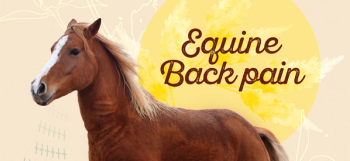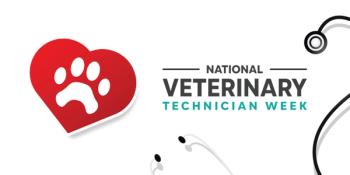
Q&A with Megan Chadwick, CVT
The academic director of the Veterinary Academy for Penn Foster Group shares her thoughts on veterinary education
Megan Chadwick, CVT, has extensive hands-on animal care expertise and throughout her career, excelled in supporting veterinarians across diverse hospital functions, particularly in patient care and educating clients. Her commitment also extends to the next generation of veterinary professionals as a veterinary technician instructor at Penn Foster and overseeing the Veterinary Academy within the Penn Foster Group. Veterinary education plays a crucial role in advancing the field, offering a multitude of pathways for individuals passionate about animal health and welfare.
Learn more about Megan Chadwick and her advice on education in this Q&A style interview:
Can you please introduce yourself and what you currently do in veterinary medicine?
My name is Megan Chadwick. I am a certified veterinary technician and I'm also the Academic Director of the veterinary technician program and all the animal–related programs here at Penn Foster.
What got you interested in the educational side of the veterinary profession?
Education was something that I kind of stumbled upon, I never really had that in my career goals. I'm pretty introverted, so I never really saw myself on the educational side, like standing in front of a class or a crowd of people. After I graduated vet tech school, I worked in general practice for a number of years, [and] I loved it. But I also saw how underutilized vet techs were at that time, and that really pushed me to go back to school, because I wanted to do more, and I wanted to be able to provide an environment for other veterinary technicians to do more.
So, I went back to pursue a bachelor's in business. At the time, I was thinking I could further my education, become maybe a practice manager. So that way, I could have a team where I was able to increase the utilization at that hospital for veterinary technicians. But while I was in school getting my bachelor's, I actually got a job here at Penn Foster, and I really haven't turned back since. I've been here for 10 years. I love the education space. I love the mission of Penn Foster and what we do here. It's really a perfect mix of what I wanted to do with giving back to the profession and increasing awareness of vet tech utilization.
Can you discuss the various career paths available to veterinary professionals?
I could probably talk about this all day. I mean, there's so many paths, I think when people think about working in the veterinary field, they automatically think about working in general practice, which, is awesome, it's a great place to start, it has a lot of opportunity for growth.
At Penn Foster, we have a NAFTA approved Veterinary Assistant Program and that's really great for people who want to work in the field. For people who don't want to work in the field, maybe they're not ready to take that leap towards a college program or maybe that's just not the career path they want. They want to be a veterinary assistant, it's amazing. It's also really great for maybe somebody right out of high school; maybe they're still exploring their career options and they haven't really been exposed to the veterinary profession. We have a lot of students that are fulfilled with being a vet assistant. All the roles in the veterinary team bring value, and we need veterinary assistants to make the team work. There's not really any right or wrong ways to go. It really depends on the person in your career goals.
Our vet tech program is an associate's degree. I prepare students to work in a lot of different areas. As far as career paths, there’s a lot of options out there. Maybe in emergency medicine, working at a specialty hospital. But there's things that are not as common, like working with large animals, with horses or cows and other ruminants and poultry. There's exotic animal medicine or laboratory animal medicine, working with those smaller cutters, like rodents and rabbits.
Our associate's degree program is mainly focused on teaching students skills with small animal dogs and cats, but there's a good amount of information on that covers all animals. We have 2 externships in the program. There's one at the end of our second semester, and that one is working with small animals, basic vet tech skills, but there's a second externship at the end, and that’s the more advanced small animal skills, and you're also doing a handful of skills with large animals and laboratory animals.
As far as veterinary medicine, I find that a lot of us are lifelong learners. I think it's the nature of the field of veterinary medicine is always changing and proving. Being a credentialed veterinary technician is a very rewarding role. We have a veterinary practice management program as a certificate degree. And we also have a bachelor’s of applied science in veterinary technology and that's a completion degree. So those are 2 really great options for people that want to continue to grow in the career fields.
What are some tips for individuals looking to enter the veterinary profession?
Remember that everybody starts somewhere, I hear a lot of students or new people doubt themselves, that they don't have any experience in the fields or working with animals, I think you have to remember, we all started that way. We all started somewhere.
Dedicate yourself to learning…that's what's going to make you successful. And take advantage of every opportunity that you have. That's really going to help your success. Everybody's path looks a little different.
How can programs like Penn Foster Group be beneficial for individuals looking to enter vet med or up-skill their expertise?
I think there's a lot of benefits; the programs are flexible. I think a lot of people nowadays, especially with the economy, they're balancing working full time, maybe have a family, have a lot of other priorities going on. So it makes it difficult to find time to prioritize your education. With us being online, it gives opportunity to people that maybe wouldn't have it.
Newsletter
From exam room tips to practice management insights, get trusted veterinary news delivered straight to your inbox—subscribe to dvm360.






